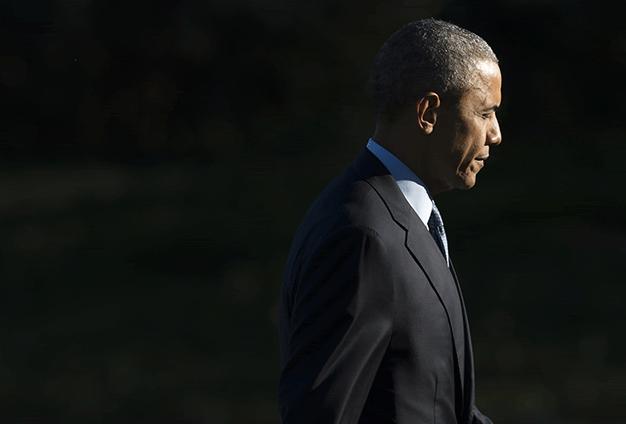Obama to hold informal talks with Turkish President Erdoğan
ISTANBUL/ABOARD AIR FORCE ONE – Reuters

US President Barack Obama walks across the South Lawn after arriving on Marine One at the White House in Washington, DC, March 29, 2016, following a trip to Atlanta to speak about drug addiction. AFP photo
U.S. President Barack Obama will hold informal talks with Turkish President Recep Tayyip Erdoğan in Washington this week, the White House said on March 29, dismissing suggestions that the lack of a formal meeting represented a snub to Ankara.Erdoğan will be among more than 50 world leaders attending a Nuclear Security Summit in Washington on March 31 and April 1, during which time he is due to have a formal meeting with U.S. Vice President Joe Biden.
There had been intense speculation in the Turkish media over whether Obama would meet Erdoğan, with some suggesting a failure to do so would mark a deliberate U.S. snub amid differences over Syria and Washington’s concerns over the direction of Turkey’s domestic policies.
At a news conference in Istanbul before leaving for the United States earlier on March 29, Erdoğan said a meeting with Obama at the nuclear summit was planned, although he said he did not know how long it would last.
Biden’s office later said the vice president would host Erdoğan for a meeting on March 31 in Washington.
“I would expect that over the course of the visit, the president will have an opportunity at some point to have at least an informal discussion with President Erdoğan,” White House spokesman Josh Earnest told reporters traveling with Obama.
Earnest said the lack of a formal meeting should not be interpreted as a snub, noting Biden’s planned meeting with Erdoğan as well as the large number of foreign leaders due to attend the summit.
“There obviously is a lot of important work to do with our allies in Turkey ... It also includes continuing to intensify our coordination on key aspects of our counter-ISIL [the Islamic State of Iraq and the Levant] strategy, including ramped-up efforts to secure the Turkey-Syria border,” he said.
Turkey, a NATO member, is part of the U.S.-led coalition fighting ISIL in Syria and Iraq.
Though allies, Washington and Ankara are sharply divided over the Kurdish forces fighting in northern Syria. The forces have enjoyed U.S. military support but Turkey, objects to it receiving such support from the U.S. as Turkey sees the Kurdish forces in northern Syria as an extension the outlawed Kurdistan Workers’ Party (PKK) inside Turkey.
One U.S. official, speaking on condition of anonymity, acknowledged there were strains between the United States and Turkey on a range of issues, but added that Washington regards Ankara’s assistance as essential to fighting ISIL.
The United States has also grown increasingly critical of Turkey’s record on freedom of expression. Biden said during a visit in January that Turkey was setting a poor example in intimidating media and accusing academics of treason.
Erdoğan, meanwhile, said on March 29 that he wanted U.S. authorities to take steps against a network of schools run by a movement affiliated with Islamic preacher Fethullah Gülen, a U.S.-based Turkish scholar whom he has accused of running a “parallel” state and of plotting to overthrow him.
















